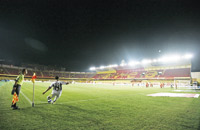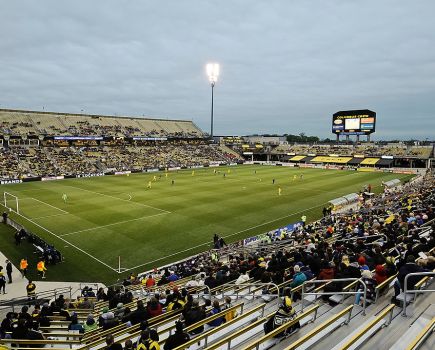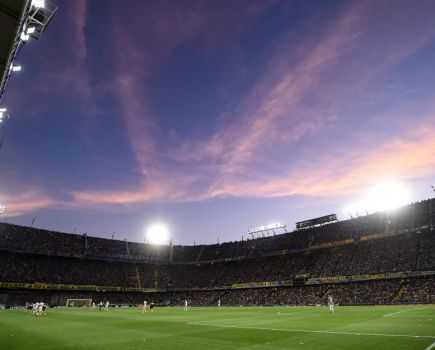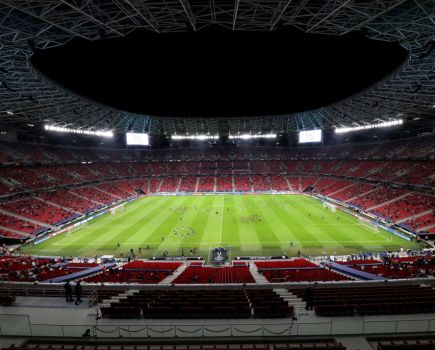ISTANBUL
 Calling Istanbul a football hotbed would be an understatement. Few cities in Europe – with the arguable exceptions of Split, Naples and Marseille, all one-club places – demonstrate a passion for the game like that found in the one that straddles two continents.
Calling Istanbul a football hotbed would be an understatement. Few cities in Europe – with the arguable exceptions of Split, Naples and Marseille, all one-club places – demonstrate a passion for the game like that found in the one that straddles two continents.
Occasionally, these passions can spill over into violence, as when two Leeds fans were murdered here in 2000. But for the casual and careful visiting neutral, a domestic match involving one of Istanbul’s big three clubs – Besiktas, Fenerbahce and Galatasaray – will be a memory to be cherished.
Moreover, Istanbul has arrived as a football capital of global importance. Galatasaray became the first Turkish club to win a European trophy, the UEFA Cup, in 2000; five years later, the newly-built, Olympic-standard national stadium on the outskirts of the city hosted the most memorable Champions League Final of recent times, when Liverpool recovered from 3-0 down against Milan to win on penalties.
The domestic league is dominated by the big three clubs – between them, they have won 43 of the 49 league titles since the national top flight was formed in 1959. The Istanbul trio were all founded more than 50 years before this, during Ottoman Empire days. Besiktas, the Black Eagles, are the oldest of all, having been founded in 1903. Galatasaray, the Lions, were instituted two years later. Fenerbahce, meaning lighthouse garden, in 1907. The Muslim Ottoman rulers frowned upon the foreign influence of football, thus the trio were based in areas with large Christian and Jewish populations and landmark foreign schools.
The founder of the post-Ottoman Turkish republic, Mustafa Kemal Ataturk, was more cosmopolitan in outlook, and also a Fenerbahce fan. By the 1920s and 1930s, there was a thriving Istanbul league and regional play-offs. But neither the clubs nor the national side had much of an impact in continental football until foreign coaches began to work here in the 1970s.
That said, the most significant progress of all was made by Galatasaray under Turk Fatih Terim, the club dominating the League in the 1990s and early 2000s, as well as achieving that European success.
Galatasaray, with historic ties to the Lycee school in the Beyoglu area, have been based in the bustling district of Mecidiyekoy since 1964, when their Ali Sami Yen stadium was opened. The ground, named after the club’s first president and famous for its charged atmosphere, will soon be closing its gates, however, with Galatasaray due to move to a new stadium in the Maslak financial district in 2009. It is doubtful whether the 52,000-capacity venue will be able to generate the kind of noise that boomed out of the Ali Sami Yen when Terim’s team overcame Borussia Dortmund, Milan, Mallorca and Leeds to reach the UEFA Cup Final. Pitted against Arsenal in Copenhagen, Galatasaray had key player Gheorghe Hagi sent off but held on for a 0-0 draw, and won the penalty shoot-out 4-1.
Terim’s departure and the advancing years of main forward Hakan Sukur allowed bitter rivals Fenerbahce to win the League in 2001 and thereby prevent Galatasaray taking a fifth consecutive crown.
Fener, the most popular club in the country, are based on the Asian side of town in Kadikoy having been formed around French college St Joseph’s. They regularly won the league title until the 1980s, and that 2001 triumph was the first of four this decade. Under German coach Christoph Daum, Fener won back-to-back championships in 2004 and 2005, and after Galatasaray clambered back on top in 2006 to draw level on 16 title victories, Fener moved ahead again last season under current coach Zico. Their revamped Sukru Saracoglu stadium will stage the UEFA Cup Final in 2009.
Besiktas’ 10 league titles pale in comparison to the other two, but at least they have the best located ground, overlooking the Dolmabahce Palace and shoreline beyond. It is also an easy hop from the main Taksim Square. Daum is one of a number of German coaches to have led Besiktas.
There are two other Istanbul clubs in the top flight, both promoted last season. Kasimpasa look certain to go straight back down, but Istanbul Buyuksehir Belediyespor, formed by an amalgamation of several municipal clubs in 1990, seem to be holding their own. Both play home matches at the Ataturk Olympic stadium in Ikitelli, in the far north-west of the city.
There are three big league derbies this spring – Besiktas-Galatasaray on March 2, Besiktas-Fenerbahce on March 30 and, biggest of all, Galatasaray-Fenerbahce on April 27. Tickets are notoriously difficult to obtain for these games. Try agency Biletix, which has more than a dozen outlets around the city, including one in Taksim metro station.
Stadiums
 The national Ataturk Olympic Stadium, which has an 82,000 capacity, is a long way from the city centre, way past the high rises of Ikitelli in the north-west.
The national Ataturk Olympic Stadium, which has an 82,000 capacity, is a long way from the city centre, way past the high rises of Ikitelli in the north-west.The national Ataturk Olympic Stadium, which has an 82,000 capacity, is a long way from the city centre, way past the high rises of Ikitelli in the north-west. Built at a cost of £50million between 1999 and 2002, it was the cornerstone of Istanbul’s failed bid to host the 2012 Olympics.
Survival Guide
Arrival & transport
Istanbul has two main airports, Ataturk and Sabiha Gokcen. Most hotels lay on a transit service for incoming guests.
The city centre is surprisingly compact, with a transport hub at Eminonu, where you’ll find a tramway, a main stop on the metro network, regular boats to the Asian side and the main train station of Sirkeci. Tickets and tokens for public transport are cheap and can be obtained from a booth on the platform or quay.
Hotels
The most prestigious hotel is the Four Seasons (Tevkifhane Sok 1; +90 212 638 8200; £190+). Other classy options include the Yesil Ev (Kabalsakal Cad 5; +90 212 517 6785; £130), also in the tourist quarter of Sultanahmet, and the trendy Bebek (Cevdetpasa Cad 34; +90 212 358 2000; £125) on the waterfront.
Tourist hotels abound in Sultanahmet, some providing substantial breakfasts on rooftop terraces. One such is the Terrace Guesthouse (Kutlugun Sok 39; +90 212 638 9733; £35).
Eating & drinking
Dining and drinking in Istanbul is an affordable joy. The first place many head to try traditional fare is Beyoglu, across the Galata Bridge from Eminonu, or the many terrace eateries in Nevizade Sok. Contemporary fare is on offer at Changa (Siraselviler Cad 87/1, Taksim; +90 212 249 1348) and, also with a view, at Mikla at the Pera Hotel (Mesrutiyet Cad, Tepebasi; +90 212 293 5656). For fish, you could do worse than the Balikci Sabahatin (Seyit Hasan Kuyu Sok; +90 212 458 1824) in Sultanahmet.
Istanbul does not stint on alcohol despite Turkey being a predominantly Muslim country. Beyoglu is the traditional hub of bar culture, particularly on and just off Istaklil Cad.
Daytime entertainment
Sultanahmet offers the bulk of Istanbul’s most famous sights, namely the Hagia Sophia (+90 212 522 1750), chief mosque of the Ottoman Empire; the imperial enclave of the Topkapi Palace (Bab-i Humayun Cad, Gulhane; +90 212 512 0480); and the Blue Mosque (At Meydani Sok 17; +90 212 458 0776). Nearby is the shopping hub of the Grand Bazaar, a maze of street traders, most notably selling jewellery and fabrics.
After dark
Nightlife is sophisticated and often glitzy, a venue such as Crystal (Muallim Naci Cad 65) in Ortakoy being typical of the genre.





